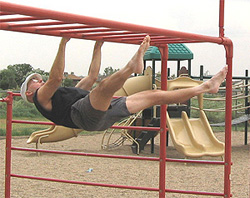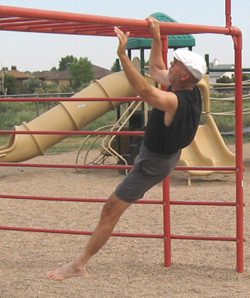www.johngill.net
| Senior Athletes : John Gill 2007 |
 At the Playground July, 2007 |
 |
|
John Gill Questionnaire Section A. 1. Year of birth: 1937 2. Height & weight (now and at younger age): Now: 6'1", 180 lbs. 40 years ago: a tad less than 6'2", 180 lbs.(different ratio of muscle to fat and fibrous tissue, however!) 3. Year you began rock climbing and/or bodyweight athletics: I began rock climbing in 1953 and gymnastics/bodyweight(BW) exercises in 1954. Discontinued gymnastics (still rings and speed rope climb) about 1967, but continued BW until present day - although much subdued! 4. Are you retired? Still working?: Retired in 2000 as a college math professor. This website is a hobby. 5. Is your family supportive of your rock climbing and/or bodyweight athletics: Yes, although my wife has been after me for several years to stop soloing - which I have, at least for the time being until my shoulders improve (?) 6. How important is the social aspect of the sport for you?: Not very. The act of climbing is a personal experience. I used to enjoy going out with fellow boulderers, however. Section
B.
1. Type of rock climbing (or bodyweight athletics) you now enjoy: Gave up bouldering 20 years ago, but continued free-soloing until 2005, when shoulder problems became acute. Now, I enjoy low unroped traverses that don't involve much in the way of dynamics. BW: some pull-ups, a few push-ups, front levers (mediocre), and one-arm exercises, plus other silly routines on the horizontal ladder. Still a little kid at heart! 2. Type you enjoyed at a younger age?: Traditional free climbing. free-soloing, and bouldering. Quit roped climbing about 1975, and serious bouldering about 1987. Formal gymnastics (rings, speed rope climb) from 1954 through about 1967. 3. Do you engage in auxilliary training or associated athletics?: The BW exercises are good for my climbing, but I really do them because I enjoy doing them! 4. How often do you climb or exercise now? At a younger age?: Once - maybe twice - a week or so. BW exercises once or twice a week. Up and down hill hiking a couple of times a week. When younger, I was a bit more active. 5. Length of climbing (or exercise) sessions now?: Climbing fairly hard stuff (for me) at ground level: about 1.5 hours of fairly continuous activity and I'm ready to go home! BW exercises: 1 to 1.5 hours. 6. How long does it take for fairly complete physical recovery?: For strenuous climbing or BW exercises, about two days. Up from about one day 40 years ago. 7. At what level of difficulty do you now climb (exercise)? Past levels?: Hard to say. I've lost the capacity for accurate grading, and the climbing I do is off the beaten track. Not very hard - moves that would be uninteresting to the youngsters. Past levels - 1950s through 1970s - V10 and under (vast majority under). 8. What changes have you observed in strength and endurance over the years? Grip strength? Arm & upper body strength? Legs? :Grip strength is still surprisingly good with no arthritis, although not quite at 1960s levels. Arms and upper body: diminished from 40 years ago, but still probably far above average for my age bracket. Legs: not much change from 40 years ago, far as I can tell. I haven't noticed much change in aerobic capacity - but, then, I was never an arobic athlete. Section
C.
1. Any injuries or illnesses since age 65 affecting your climbing/exercising? How have you coped? NSAIDs or other medication? : Tore the right biceps off the forearm in 1987, and quit bouldering after surgical repair. Occasional climbers' or tennis' elbow. Severe shoulder arthritis and rotator cuff tears diagnosed 2005. Decided against shoulder replacement or surgery for cuffs. Went back gradually to my exercises, and now feel pretty good again. I take a couple of (200mg) ibuprofen tablets each day and an over-the-counter arthritis preparation that includes hyaluronic acid and glucosamine. Maybe a couple of aspirin at night. I do get tachycardia at times and have to overcome it by simple exercises. 2. What kind of diet do you follow, if any? Vitamins? Stimulants?: Lots of high quality protein. A can of tuna for lunch most days for many years. Lots of milk. Fruits: apples and bananas, grapes. Some veggies when my wife insists. Whole grain bread. Love chocolate and eat refined sweets for energy before exercising. Like salt. Lots of vitamins for many years. No problems with blood pressure or sugar metabolism, etc. Enjoy milk, cokes, tea, and a little coffee. Not much for beer or wine, but I do like an occasional Zombie. 3. Special food or drink after a workout?: A big glass of fortified, dark chocolate milk. 4. Water or fluid intake? High? Low?: When I get thirsty - short of what popular gurus recommend. Section
D.
1. What is your current philosophy of your sport? Has this changed with age? : I enjoy the pure physical movement - the kinaesthetics - of the sport, and the intensity of focus, like a moving meditation. But mostly I think of climbing as great exercise, much of which is safely near the ground. I enjoyed the adventure aspect of free-soloing for many years, before arthritis made me think twice. At one time I was somewhat competitive, but that's all gone now - except for some personal and private pet projects that allow improvement or simply continued performance near my current limits. 2. What are your current goals and personal rewards from the sport? Has this changed with age?: To stay active and get some measure of enjoyment out of the sport. A good senior exercise. 3. What is your opinion: Is rock climbing (bodyweight exercises) performance - at any age - influenced more strongly by genetic attributes or training and experience? (Nature or nurture?) Is it even possible to generalize?: From purely personal observations, I suspect that - if any sort of generality exists - genetics is quite a bit more important than training, although both are of course required for top performances. Some people - both men and women - are simply designed for climbing, while others are not. 4. What are your predictions for the future of rock climbing?: Probably more diversity and more offshoots, like slacklining, accompanied by a segment of the climbing population involved in increasingly formal competition. Perhaps leading to an analogue of the peculiar scenario known as "womens'" gymnastics. |